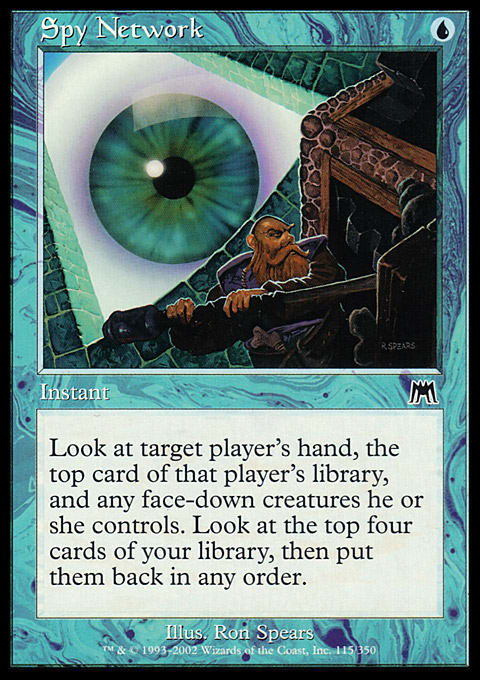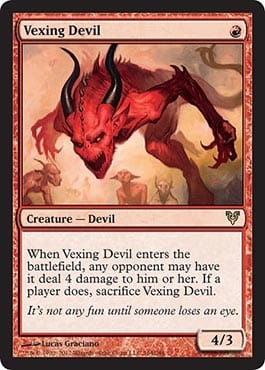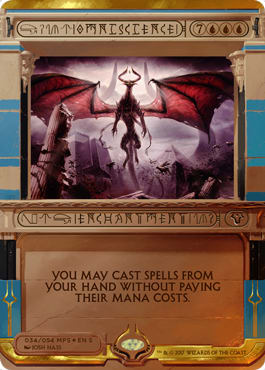I’m currently making a living in Magic finance. Sometimes, it can be a real drag, and the disconnect between what you might consider a fair evaluation of your cards for sale and the price dealers are willing to pay can sometimes be a much bigger divide than you’d thought. But there are rare circumstances in which the treasure hunt pays dividends and you spend the next week feeling invincible. If you’re not a big fan of the feast and famine of collection hunting and the constant interstate travel necessitated by binder grinding, you can do what I’ve done and set up shop on eBay. In most cases, eBay is a predictable source of income.
However, every once in a while, something very unpredictable happens, and a recent puzzling event started me thinking about the construction of my electronic network. This week, I’m going to talk to you about the social medium called Twitter.
Making the Case for Twitter
Not everyone who plays Magic is on Twitter right now. I can certainly see why one might not instantly make the connection between how a social medium that seems to be fueled entirely by trivia and narcissism could possibly help connect players and help them improve their games. I resisted Twitter for a very long time because I did not see the value in it, and as is the case with many late converts, I’m am all about spreading the word and making sure others who were in the same camp I was once don’t make the same mistake.
In the Against column, we have the presumption that Twitter is entirely unnecessary. It’s a cold and impersonal way to connect to your physical network (if you have no idea what I mean by electronic and physical networks, you can refresh your memory by checking out my last article in which I define those terms) because you see those people in person and probably have easier ways to contact them—like with a text message or a post on the playgroup’s Facebook wall. If you follow a stranger, what are the odds that person is going to give any good information for free to you, a stranger to him, or brag about innovation publically? If the people sharing tech with you already will do so more easily and strangers won’t share at all, Twitter must just be full of egomaniacs taking pictures of their lunches (but you’d be wrong; that’s Instagram). I was a victim of this mentality for a long time, equating Twitter to a room full of people all talking out loud where no one is listening because they’re talking also.
This presumption, however, seems to be limited to the uninitiated. One thing to understand about Magic players is: Maybe a bit of narcissism on their part may actually help you. While it’s usually a bad idea to share tech for free with those outside your play group, the desire to show everyone how clever your innovation was can be a strong one, and good information is routinely volunteered. Butter a few people up, and they may just give you a little more information than they should have. Also, who says those strangers have to stay strangers? The more you interact with people on Twitter, the more likely they are to want to give you information when you ask or want to hang out in person when you’re both travelling.
Okay, I’ll Buy It. Twitter Is Worth It. What Was That about eBay Earlier?
One day, for seemingly no reason, all of my copies of Vexing Devil sold on eBay in a matter of hours. Thinking I was smart, I had listed one more copy than I had so that as I sold them at my normal pace, when my stock became low, I could change the number I had available instead of selling out and having to pay to relist them. In this case, I blew out of them so fast I had no time to pick more up, and I had to run out and trade for a Vexing Devil to complete my orders. It goes without saying that I was equally vexed, so I turned to Twitter to see if anyone knew why I’d been wiped out of a card I was selling at exactly retail.
Since I consider myself primarily interested in the financial aspect of the game, my Twitter network has a large contingent of Magic: The Gathering finance personalities. I put it to Twitter: “Does anyone have any idea why I sold five play sets of Vexing Devil in four hours?” The responses really surprised me. This was an entirely finance-based question, or so I thought. But all of the finance gurus in my network were as puzzled as I was. “Misclick?” one of them posited, while others had no answers beyond, “Beats me,” or, “lol”.
Imagine my surprise when the answer to a finance question came from the player base in my network. In less time than it took a bunch of binder grinders to share my confusion, the players in my network had answers ready. Vexing Devil, it seemed, was seeing serious consideration in a mono-red Modern deck that was doing well in daily queues on Magic Online. Now, I’m confident that once Monday rolled around and I went through my weekly ritual of summarizing the decklists from weekend events on Quiet Speculation, I would have had my answer. However, that would have been Monday, and here it was Friday night, and the players had my answer for me. I had the weekend to hit up a Friday Night Magic and a Grand Prix trial, grind out four play sets from a population that was a week behind and trading at last week’s prices, and get them posted on eBay. Three of those play sets had sold by Monday.
It seems counterintuitive that I received a solid financial tip from players, but is it really? Isn’t the business of Magic finance really the business of having the cards players want so you can get paid? Who knows which cards the players need sooner, the players or the financiers? How quickly will financiers share tips about which cards are starting to sell out with their competitors? How quickly will they even know a card is hot until they’re out of stock? Meanwhile, a player asking me for a set of a card on Thursday can help me set my price a little bit higher so that when they are starting to sell out on Saturday, I’m not caught flat-footed.
Can it work the other way? Not only does it, I have an anecdote locked and loaded. Weeks before Luis Scott-Vargas blew our minds with Omniscience in Show and Tell (“Oh, you’re putting out Gilded Drake with Show and Tell? That’s nice, I’ll put out Omniscience. Free Gris, free Emrakul, pass the turn. Don’t forget to sac your Drake.”), the players in the Grand Prix in Ghent were all about this card. Even before that, the finance community was tipped off by a spike in sales of Omniscience in the same orders as cards like Intuition and Sneak Attack to buyers overseas. Armed with this tip, players in the same network as a savvy financier had weeks to test this tech and tune their Show and Tell lists.
There is a danger in using any social medium for the purposes of information gathering with blinders on. Following only financiers because you consider yourself a financier is detrimental. Similarly, not having any indication about what is going on in the financial community can leave you unprepared when the metagame shifts and your network full of players had no early warning. Remember that you can’t talk to every player, but if you talk to some of the financiers with whom they may have inadvertently leaked some tech, you may be just as well off as if you had talked to that player for yourself. It was the finance community who noticed Humility was moving well in trades before the player base had fully comprehended that Humility is more than just a budget Moat in Legacy. In fact, most of the player base hasn’t even come around to that conclusion yet. Pro tip: Maverick is really bad when it has a pile of Benalish Heroes trying to race you, and 15 mana is a lot to pay for an Emrakul that neither flies nor annihilates.
The takeaway lesson is if you’re going to use Twitter (and you really should), it’s vital to optimize your network to generate the largest value. If you’re a player, don’t just follow players—add a healthy number of financiers to pick up your hot tips before the metagame shifts. If you’re in it for the money, a liberal smattering of cardboard slingers can let you know what their needs are a lot faster than analyzing sales trends in hindsight can, and that will allow you to strike while the iron is hot. The members of your network are an asset, and assets should be diversified.
As a final thought, this article got me thinking about the concept of “filter bubbles” and made me remember an interesting TED lecture I saw on the concept. This video is kind of long but worth watching. Make sure you construct your electronic network with this concept in mind to avoid missing out on a lot of vital information.
Thanks for joining me again. Check this space next week, when I’ll talk about what happens when your electronic and physical networks merge.

























